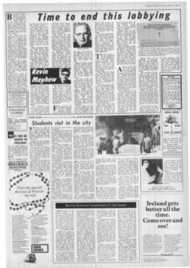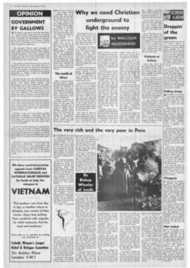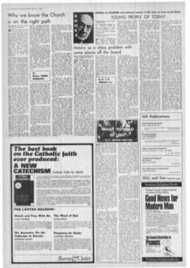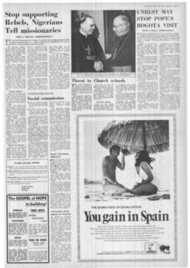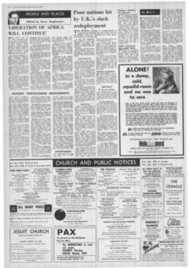Page 12, 15th March 1968
Page 12
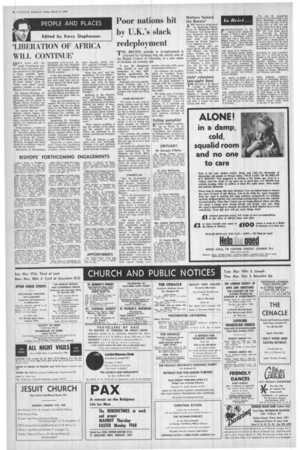
Report an error
Noticed an error on this page?If you've noticed an error in this article please click here to report it.
Tags
Share
Related articles
Christian Aid Attacked
Charities Challenged
`ban Poverty' Campaign
Gulf Crisis Hits Poor Nations Hard
Peace Groups Attack Arms Sales
Poor nations hit by U.K.'s slack redeployment
THE BRITISH attitude to re-deployment is criticised by Christian Aid, the charity arm of the British Council of Churches, in a new series of booklets on overseas aid.
It says the changeover from textiles to cars and computers is only halfhearted. insufficiently financed and "being carried out too late."
Politically and economically, claims Christian Aid, it is not right for the British textiles industry to keep trying to compete with India and Hong Kong.
"TIME MOVES ON" "Of course, at one stage in history textiles were the basis for British exports; but time moves on. We are no longer at our best in labour intensive industries," says the booklet.
"We are at our best where we use a lot of technical expertise, a lot of capital and small amounts of well-paid labour, as in such industries as engineering, automobiles, and computers.
"Let someone else produce the textiles and we will import from them what we need. It does not pay us to be a Jack of all trades."
Answering the criticisms that such a policy would create even more unemployment in the Midlands and North (Birmingham has just announced one of its biggest unemployed figures) Christian Aid says: "Of course, the textile workers of Lancashire do not want to be uprooted and moved into other types of work.
UNPOPULAR "Also the Government is afraid of pushing them too hard because unpopularity with the Lancashire electorate could cost it a significant number of seats at a General Election.
"Yet if the Government invested enough funds in retraining these workers for other more productive jobs, giving grants to factories to change over to other industries, the Government, the country and the people of Lancashire, before very long, would all be better oft.
, "The people would have higher paying jobs because their productivity would be higher. The country would have its cost of living lowered because some basic goods would be cheaper, and the Government would be sitting on top of a more competitive economy, giving it 'less balance of payments' headaches."
By buying more overseas textiles, Britain would raise the living standards of the underdeveloped countries. However, it prefers to take the short-term view and defend itself against foreign corn petition with high tariffs, quota arrangements and levies."
The Chlistian Aid booklets, edited by Jonathan Power, formerly of the Catholic institute for International Relations, are being published to coincide with the Conference on Trade and Development (UNTCAD) now in session in New Delhi.
The whole series of booklets are part of Christian Aid's Poverty Campaign, which has official Catholic Church backing. It is basically an education programme to get public understanding of why the gap between the rich and poor countries continues to grow wider.
Ealing pamphlet
EALING ABBEY is publishing on March 21, St. Benediet's Day, a pamphlet, "Infallibility and Authority," by Bishop Butler, Auxiliary of Westminster, and Fr. Edmund Flood, O.S.B. The price will be Is.
OBITUARY
Mr. Donough O'Malley
Mr. Donough O'Malley, Ireland's Minister of Education, who has died, aged 48, was the man who Initiated the scheme to merge Dublin's two colleges, Trinity College and University College. He played a leading part in reforming the Irish educational system and was a gifted politician and potential Prime Minister.
Fr. John McKearney
Fr. (Peter) John MeHearney, who served in the Westminster Diocese for more than 20 years. at the home of the Little Sisters of the Poor. Dundee. He was ordained in 1947 in St. Patrick's Cathedral. Dundee, by the present Archbishop of Glasgow (then Bishop Scanlan), after studying at Osterley and St. Edmund's. Ware. Ile served at Tottenham, but due to continutcd ill-health was forced to give up his priestly duties last year.
Fr. Kevin Harrison
Fr. Kevin Harrison, 0.F.M.Cap,, who was knocked down by a car and killed In Providence, Rhode Island, U.S.A., on March 6, aged 66, was a member of the English Capuchin Province, but had worked as a preacher of missions and retreats in Americaesince 1952. He was born in Leeds, and before going to America was Novice Master, Commissary Provincial of the Third Order, and Provincial Definitor, at various times. Fie was Guardian of Peckham at the outbreak of World War 11. He later founded Greyfriars, Uddingston. Glasgow.
Mrs. Isabella McCambrIdge
Mrs. Isabella McCambridge, a member of Newcastle upon Tyne City Council for 22 years. aged 60, at her home in Heaton. Mrs. MeCambridge, a parishioner of St. Teresa's, Heaton Road, had been elected a Sheriff a few days before her death. In 1958 ahe was Lady Mayoresa of Newcastle.
Fr. Francis Marley
Fr. Francis Marley, Parish Priem of St. Mary's, Hexham, Northumberland Mr 22 years, aged 84. at St. Mary's Presbytery. He would have celebrated his diamond Jubilee in the priesthood in June. Ile was born at Cornett, Co. Durham, and educated at St. Cuthbert's Grammar School, Newcastle. Later he went to Douai and to the Propaganda College in Rome. His first appointment was to St. Joseph's. West Hartlepool. old later he was parish priest at Windermere. Amble and Sunderland.
blog comments powered by Disqus




